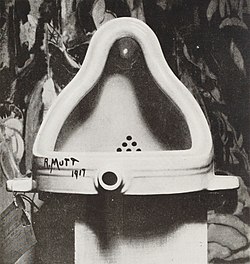Avant-garde

Avant-garde in French means advance guard, or vanguard. People often use the term to refer to people or works that are novel or experimental, particularly with respect to art, culture and politics.
The vanguard, a small troop of highly skilled soldiers, explores the terrain ahead of a large advancing army and plots a course for the army to follow. This concept is applied to the work done by small bands of intellectuals and artists as they open pathways through new cultural or political terrain, for society to follow. Because of the implication of specialization of the avant-garde in military terms, some people feel the expression implies elitism when used to describe cultural movements.
The term also refers to the promotion of social progress and reform, the aims of its various movements presented in public declarations called manifestos. Over time, avant-garde became associated with movements concerned with art for art's sake, focusing primarily on expanding the frontiers of aesthetic experience, rather than with wider social reform.
The origin of the artistic avant-garde can be fixed at May 17, 1863, the opening of the Salon des Refusés in Paris, organised by painters whose work was rejected for the annual Paris Salon of officially sanctioned academic art. Salons des Refusés was held in 1874, 1875, and 1886.
By some assessments, avant-garde art includes street art, for example graffiti.
Surrealism claims to have transcended the avant-garde.
The comic strip Calvin and Hobbes notably ridiculed avant-garde on several occasions, with Calvin making "art" (usually snow sculptures) and using contrived psychobabble to explain why he should be showered with grants and money of the viewing public.
Pearls Before Swine also is skeptical about avant-garde art, with one comic ending with Rat proclaiming that "avant-garde" was French for "bad." (Similarly, and perhaps ironically, John Lennon is said to have stated "avant-garde is French for 'shit'").
Examples of avant-garde
- Abstract expressionism
- COBRA
- Constructivism
- Cubism
- Dada
- Experimental film
- Experimental music
- Experimental theatre
- Futurism
- Fluxus
- Impressionism
- Lettrisme
- Mail art
- Modernism
- Neoism
- Pop art
- Situationist
- Social realism
- Zeitgeist
Related article
External link
- The Japanese avant garde scene
- cinema avant garde (en, fr, es, de)
